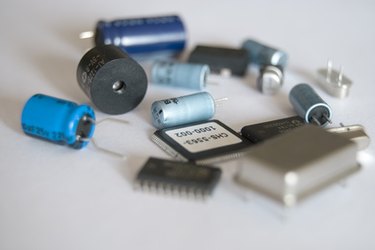
Electronic filters are used to prevent certain electronic frequencies from passing from one region of an electronic circuit to another region of that circuit. Electronic filters generally perform one of three functions: allowing certain electrical frequencies to pass through the filter, blocking certain frequencies from passing through the filter and completely blocking direct current electrical energy.
Band-pass Filters
Video of the Day
A "band-pass" electronic filter is a tuned electronic circuit, which allows electrical signals operating at a certain frequency to pass from one region of the circuit to another. If the frequency of an electrical signal is greater than or less than the frequency the band-pass filter is set for, the filter creates electrical impedance (akin to electrical resistance in a DC circuit) that prevents any electrical power from that signal from passing through the band-pass filter. However, if the signal frequency is at or near the set frequency of the band-pass filter, the filter will allow the signal through.
Video of the Day
Band-stop Filters
A "band-stop" electronic filter is a tuned electronic circuit that acts in a manner opposite to the band-pass filter. If the frequency of an electrical signal is greater than or less than the band-stop filter is set for, the signal will pass through the filter. As the signal frequency becomes closer to the band-stop filter's set frequency, the filter creates electrical impedance that prevents any electrical power from that signal from passing through the band-stop filter.
DC Blocker Filters
In some circuits, such as some parts of audio amplification circuits, direct current electrical power is undesirable. Since DC power cannot travel through either capacitors or transformers, one or both of these electrical components may be employed to block DC power from traveling to another part of the electronic circuit.